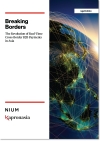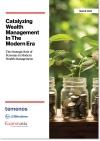"In conversation with..." is a new series from Kapronasia featuring conversations with some of Asia's most interesting fintech players and companies. To keep up with the series, please subscribe to our newsletter. If you have an interesting story and want to be part of the conversation, please This email address is being protected from spambots. You need JavaScript enabled to view it.
Revolut has grown to be one of the largest and well recognized fintechs in the world. A July 2021 funding round valued the start-up at US$33B. With a significant war chest and ambitious plans, we sat down with Alan Chang, Revolut’s Chief Revenue Officer.
Thanks for taking the time Alan and great to connect. Let’s jump right into the conversation. To kick things off, how does Revolut decide on the products to prioritize, both financial and non-financial, to include?
Sure. For us, it's quite simple. We just look at the customer problems, and we just go in one by one and solve each one of them. Obviously within that, we prioritize based on impact, but at the end of the day, it's really down to solving customer problems. In terms of how profitable or lucrative it could be, for us, it's not that relevant. If, for example, Stays is a great solution for helping customers travel simpler, easier, and cheaper, and that's basically what we built. So it's less about whether it's financial or non-financial, more about solving customer problems.
Makes sense, but of course all of the products would have a financial component, correct?
Yes. Obviously Stays makes booking hotels super easy, given we already have a financial relationship with a customer, so it does make checkout super seamless. But that's just one component. There are also considerations around hotel discovery, pricing, as well as inventory that we have to consider as well for the product.
For the Stays product, dealing with inventory and things is not Revolut's core value proposition. For products like that, do you then partner or do you try and build the capability in-house? What are the key considerations for doing it in-house versus partnering?
Correct. For this instance, we launched with a partner who has a lot of inventory and a very, very good offering for customers. So we decided to partner with them in this instance.
To decide whether to partner or not, we consider several things. Whether a license is required, the go-to-market timeline versus quality, quality of the product. So basically we break it down by business considerations as well as customer considerations. So on the customer considerations it's non-negotiable. For example, the quality of the product, quality of the service, it needs to be great, so that's non-negotiable. Whereas on the business side, that's where we think about whether we do it in-house or partnering. So if it's fast to go-to-market we partner, versus a cost-to-build versus whether license is required. These are the business considerations we think about whether we do it in-house or partnering.
So would the optimal scenario be to be licensed in potentially every country you could be in? Would that be the end goal?
Our objective is to give every single person in the world access to a Revolut account. We believe money has no borders, should be frictionless. And changing money between hands or different people, between other assets, right, or between borders, should be easy, free, and super cheap to do it. And we believe Revolut is the best solution and we do want to get Revolut in the hands of as many people as possible in the world.
How would that look practically? Here in Singapore Revolut is not licensed as a bank but as a payment provider with the eventual idea to have a banking license, or would you, in markets like Singapore, would you rather bank as a partner?
That is a great question. In Singapore right now, we have effectively a EMI payment license, so it allows us to do a lot of things already, allows us to offer a lot of custom offerings. It does not allow us to offer some banking offerings. However, I think in countries like Singapore, the regulatory capital requirement is extremely high. And for us it didn't make much business sense, right, to obtain a banking license in Singapore right now.
As you said, it's a balance between what we want to offer to the customer versus what is best for the business. We always want to prioritize what is best for the customer. There are some things on the customer side we'd never compromise like quality product or service. But in this instance, in terms of having enhanced customer offering via obtaining a banking license, it just didn't make sense for us.
Interesting. Shifting gears slightly, looking at the market opportunities - what segment of the market both from a geography and product perspective do you see as having the biggest opportunity for Revolut? Cross-border payments? Wealth management? Domestic payments?
I think all the spaces you mentioned we already participate in some form already. We do believe there's a lot of value in having all the financial services and more in a single app because it makes it super easy for people to access it in one click. Super convenient and super easy. And we do it at a super competitive rates. So for us, our target market is everyone with a smart phone and some form of ID, that's really our target market. So it's basically everyone. And that's not even limiting to adults, right. We also have a very, very good junior offering as well. So it's really anyone with a smartphone and some form of ID.
In terms of opportunity in geography, for Revolut every market is opportunity. So unfortunately, because of resource constraints, we have to prioritize which markets we go to. So for us, the question we ask ourselves is not whether we want to be in a market, the question we ask ourselves is which market we go first.
Talking about COVID-19 for a second and the pandemic, how did COVID-19 change Revolut’s approach to the market?
COVID-19 changed quite a few things. First of all, as you know, travel was part of a big value prop for Revolut, and when travel died during COVID-19, we had to rethink how we approach building products for customers. We very much focus on building products for the domestic use-case. For example, we launched Revolut Shopper, which is a Chrome plugin where it automatically generates a one-time virtual card for you, so it makes online shopping much more safe. It protects yourself against someone stealing your card details, which can limit the risk completely for these scenarios, and it also automatically finds you rewards, that you would have otherwise missed on the e-commerce side of shopping.
We also put a lot of effort and focus on the investment and wealth use-cases as well, which are things people still did, and actually did more whilst at home or whilst locked down in their country. So actually we've seen, although we had a temporary dip in revenues during the first lockdown in COVID-19, actually we've seen we were actually outperformed overall. We actually did pretty well financially as a company.
The other thing is we had to change the way we work. We've gone from everyone worked in the office to now we're actually a fully remote company. Not only everyone can work from home, we actually hire in basically everywhere around the world, right. For example, one country we've been hiring a lot from lately is India. I think we have over 50 people in India if you exclude the team that actually works on the Indian market, but in total we have I think almost 100 people in India working in Revolut. And actually pre-COVID-19, we had only a few. India is a great market to hire from, lots of talent. It's an example of how we've transformed, how we work. And actually, I'll say in terms of productivity, we not only haven't lost any productivity, because working remotely, we actually increased productivity - and people are happier. And also the company's saving more money, therefore we can afford to pay our employees better as well.
Great – thanks for that. Last few questions. Many companies, both fintechs and banks, look to Revolut for inspiration. What companies do you look at for inspiration for Revolut?
I think several companies. Whilst we believe and when we see that we analyze a company, we sometimes... Rather than looking at its success, we sometimes look at the opportunities they missed, similar to how we look at ourselves. So for example Amazon, we think... If you look at Amazon, right. Amazon, although they're quite a established company, that you've seen them innovating over the years, right. I think Amazon Web Services (AWS) is a great example. It's just something they did for themselves because they couldn't find a better solution and then they realized actually they can sell this, right. And actually it's one of the most profitable business lines they've ever created, right, even more profitable than their original business. Another one's Tesla, right. I think it's also another great company building a great product that customers absolutely love.
Last question, what keeps you up at night with regards to Revolut's challenges and opportunities?
For me personally, it's the missed opportunities like what can we be doing better? We're in a very, very big space, right, we also in a lot markets and unfortunately we do have missed opportunities. For us, when you look outside then it may look like we're doing okay, right, but when you look inside out, you're thinking, "Okay, no, we missed this opportunity, we missed this opportunity, and how can we be doing better?"
Great – thank you for that Alan. Thank you for taking the time.
Thank you too Zennon – good to connect.
Join Alan’s Keynote Panel: ‘Open banking – How can you aggregate your banking, insurance and investment information across banks and financial institutions on a single platform, allowing for easier comparability and higher level of competitiveness?’ which will be moderated by Joe Jelinek, Research Director at Kapronasia. Register now to attend FinTech Connect Asia (Virtual Main Conference Days: 6-7th October, SGT).





